Some addiction therapists say giving your child a smartphone is like giving them cocaine.
Smartphones and other tech devices activate the same neurological reflex as drugs. In fact, researchers found young adults, when disconnected from the internet, experience withdrawal symptoms typically seen in people addicted to cigarettes or other substances.
While parents sometimes joke about how much their kids are on the phone, it’s no laughing matter among local counselors who say they’re seeing an increase of addictive behaviors in teens when it comes to phone use.
Dr. Jan Newman, a counselor at Southeast Psych in Charlotte, said, "There’s not really a magic number, but general guidelines are anything two hours or less is recommended total screen time.”
Most parents we talked to found that number extremely low.
Jen Murless believes, "most kids today are definitely over that.”
Some statistics suggest teens are using media nine hours a day. That includes smartphones, games and TV. Another mom, Anita Hudson, think that number is probably too low for reality, too.
Counselors at Southeast Psych are treating an estimated 20 teenagers a week with problematic media behaviors in connection with additional issues like anxiety or depression.
“It’s usually social isolation, insecurity, low self-esteem, then smartphone addiction kind of comes into the mix,” said Dr. Newman. She believes parents have a right to be concerned.
“You see loss in social relationships, family relationships, academic performance is falling off and there’s a lack of insight. The teen doesn’t really see it as a problem.”
But moms like Mary Ellen McElroy do.
“That’s why I have strict guidelines at home," said McElroy.
Experts suggest helping your teen recognize the triggers that make them reach for their phone and focus on in-person relationships and build coping skills.
Hudson also gives her kids a phone curfew and she’s not afraid to take the phone away if necessary.
Dr. Newman encourages parents to talk calmly to their kids if they are worried and avoid using words like addiction in the conversation.
“It might be saying something more like, ‘I’ve noticed that you’re on your smartphone more than you’re talking to me, your brothers or sisters and it seems to be affecting our family. Can we talk about it?’”
NBC Charlotte found three apps that track usage for a better phone/life balance.
'Moment' allows you to set daily limits and notifies you if you exceed them. There’s even a setting to force you off the phone by flooding your screen with annoying alerts if you try to extend your screen time.
'Checky' tracks how many times a day you check your phone. You can also map where you check it the most.
'Space' uses a personalized digital behavior change program to set goals, monitor behavior and track progress.
Murless takes a low tech approach.
“Encourage, go read a book, go outside, go do something with your friends. That kind of thing. I think its just more of redirecting than just always saying get off, get off, get off,” she said.
Dr. Newman points out, “Bill Gates and Melinda Gates won’t let their kids use smartphones until 14 and what does that say to us just you know lay people, lay consumers.”
Dr. Newman told NBC Charlotte teens who already have mental health issues or impulse control problems like ADHD are more susceptible to addictive smartphone behaviors.
The American Academy of Pediatrics can help you develop a customized family media plan.

